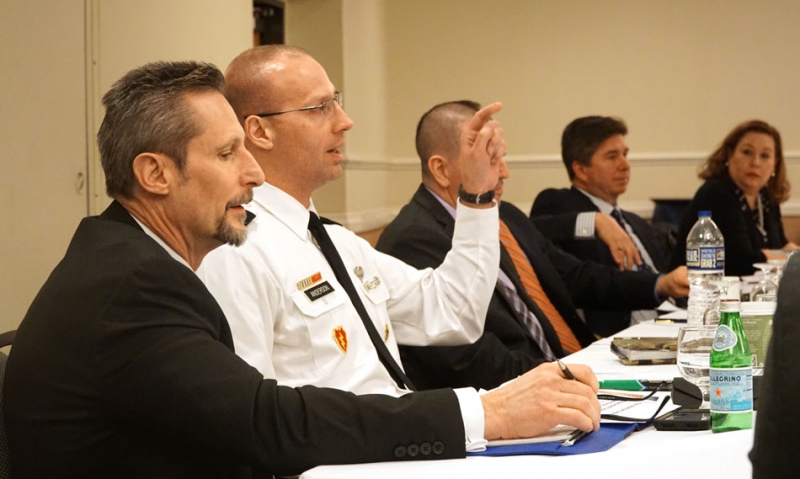
Legion’s Employment Innovations Taskforce convenes for first time
The American Legion Employment Innovations Taskforce convened for the first time on Feb. 22, during the Legion’s 58th annual Washington Conference at the Washington Hilton Hotel in Washington, D.C., to discuss military service initiatives and private sector recruitment practices used in fostering career opportunities for servicemembers who are transitioning into the civilian workforce.
“The true purpose of this meeting is to ensure that our transitioning servicemembers have a seamless transition,” said Ariel De Jesus, chairman of the taskforce and the Legion's assistant director for the Legion’s National Veterans Employment and Education Division. “We want to make sure that they’ve got opportunities when they leave the military.”
Early in their careers, De Jesus said servicemembers gain opportunities for direct experience that are unprecedented in the civilian sector. The eligibility requirements rarely offer direct recognition of military training and experience as a means of qualification, creating gaps and other barriers in the transition process.
Part of the taskforce’s initial objective is to conduct independent surveys and assessments regarding the efficacy of content currently being delivered through the Transition Assistance Program (TAP). The group is also seeking to learn what recruitment efforts private sector employers are using to hire transitioning servicemembers now and in the future, according to Avue Technologies Corporation co-CEO Linda Brooks Rix.
“We’re looking to (examine) the technology that is available and has been used to support that level of engagement,” said Rix, whose father served 20 years in the Army. “We’re also looking to adopt and learn about best practices from private sector employers that have veteran-friendly workplaces … (as well as) how to incorporate, expand and broaden the scope so that (their) family members are included.”
The American Legion has a long history of advocacy on behalf of increased civilian workforce opportunities for servicemembers and veterans. However, due to the magnitude and complexity of issues, Rix said a lot of work is still needed in order for servicemembers and veterans to attain the opportunities they desire and boost their career prospects in the civilian workforce.
“I think what works out best is when you get feedback from leaders who actually hire veterans,” De Jesus said.
When it comes to attaining career opportunities, De Jesus said enlisted servicemembers and veterans face unique challenges because their occupational training is attained primarily through their military service, as opposed to the more traditional approaches essential to civilian career preparation.
According to a report on the state of credentialing, civilian hiring managers have difficulty assessing military training and experience. If, however, military-trained applicants have a civilian occupational certification, employers may be better able to assess their qualifications and be more likely to hire them.
The report also noted that understanding what value employers place on specific certifications would help servicemembers and veterans better differentiate among competing certifications. Initiatives are underway to bring clarity to this issue, including initiatives sponsored by the U.S. Department of Labor.
“The military spouse network is different than, in most cases, the veteran network which is mainly state and federal focused,” said CACI Military and Veteran Affairs Director Gary Patton, an Army veteran. “On (the aspect of) transitioning servicemembers, we focus primarily on our Soldier for Life, Marine for Life, Air Force and Navy equivalent service programs, as well as the (veteran service organizations) VSOs that support a lot of (military) bases.
“Our veteran outreach program is called Continuing Your Mission – a lot of our employees are former military. Thirty-five percent of our company is veterans. We also have a master outreach list. These are people that we can inform about jobs that we have for transitioning servicemembers, veterans and military spouses.”
Fortunately, the Legion has committed itself to addressing the stakeholders who play a role in facilitating the ability of servicemembers and veterans to attain civilian job opportunities, while ensuring that their unique needs are accommodated in a broader scope.
The American Legion believes that part of fostering career opportunities for transitioning servicemembers includes the need to embrace military training and experience as a more widely accepted form of demonstrating competency to perform in the civilian workplace. As a consumer, the Legion is optimistic that the military will be able to readily attain critical information by staying abreast of various trends and initiatives.
“It’s too hard right now (for transitioning servicemembers) to get jobs,” Patton said. “We need to have common digital frameworks and tools where these jobs can be electronically transmitted and linked to our transitioning servicemembers … and find better ways to connect with the network of counselors who (have day-to-day interactions) with those servicemembers looking for jobs.”
Some research has shown that online job postings tend to be oriented to high-skilled, white-collar occupations requiring a bachelor’s degree or higher. Because of this barrier, most transitioning servicemembers would not fit into that category and may be underrepresented in current data sources, according to the report.
While research on credentialing outcomes is available in some industries such as information technology, very little systematic research has been done on the extent to which a specific credential contributes to labor market outcomes. Research is also scarce on outcomes for servicemembers and veterans.
“I don’t think there’s a consensus around how we define success within TAP,” said Rosye Cloud, senior advisor for Economic Opportunities at the Department of Veterans Affairs. “What is meaningful employment? Is it paid charity to what they were making in the military? Is that aspirational for some veterans that may have been overpaid basically for what the market now values their skillset at once they transition? Maybe this taskforce can help raise attention to some of those issues.”
